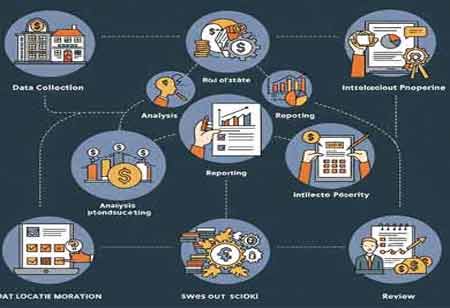CLOSE
Specials
- RegTech Europe
- Financial Risk Management APAC
- Investment Banking APAC
- Corporate Advisory APAC
- Regtech APAC
- Escrow Services
- Digital Banking Latam
- Trading Solutions APAC
- Treasury Management Europe
- CPA Firms Canada
- Financial Risk Management Europe
- Mortgage Broker
- Financial Licensing Europe
- RIA Advisory Europe
- FinTech Canada
- Financial Asset Management APAC
- Investment Banking Canada
- Payment Solution
- Lending Mangment Latam
- Payment Solution Europe
- Broker Dealer Firms Canada
- Alternative Investments Canada
- Financial Fraud
- Investment Management Latam
- Financial Health Europe
- Lending mangment
- Financial Marketing
- Proprietary Trading Europe
- Wealth Management
- FinTech
- Financial Brokerage Firm APAC
- Investment Advisory Europe
- Investment Advisory APAC
- Wealth Management MENA
- Claim Adjusting
- Claim Adjusting APAC
- Mergers and Acquisitions Consulting APAC
- Equipment Financing
- CPA Firms
- Mergers and Acquisitions Consulting Canada
- Investment Services
- Valuation Services Canada
- Wealth Management APAC
- Broker Dealer Firms
- Debt Collection Agencies
- Mergers and Acquisitions Consulting
- FinTech Europe
- Fintech Latam
- Financial Planning / Retirement
- Investment Management
- Financial Compliance
- Digital Banking Europe
- CFO Services
- Debt Collection Agencies Europe
- Wealth Management Europe
- Mergers and Acquisitions Consulting Europe
- Financial Restructuring Europe
- Financial Portfolio Management Canada
- Business Loan
- Payment and Card Latam
- Wealth Management Latam
- Mergers and Acquisitions Consulting Latam
- Tax Advisory Canada
- Trading Solutions Europe
- Alternative Investments
- Digital Insurance Europe
- Investment Services Latam
Weekly Brief
×Be first to read the latest tech news, Industry Leader's Insights, and CIO interviews of medium and large enterprises exclusively from Financial Services Review
Thank you for Subscribing to Financial Services Review Weekly Brief
Demystifying Digital Gains: Demand for Cryptocurrency Taxation Services

By
Financial Services Review | Thursday, May 22, 2025
Stay ahead of the industry with exclusive feature stories on the top companies, expert insights and the latest news delivered straight to your inbox. Subscribe today.
The explosive growth of digital currencies has transformed the financial ecosystem, creating a parallel economy fueled by decentralized transactions, digital wallets, and blockchain-based investments. As individuals and institutions embrace cryptocurrencies for investment, trading, and operational uses, governments worldwide are playing catch-up to impose regulatory clarity. Cryptocurrency taxation services are emerging as critical tools in ensuring compliance, avoiding penalties, and managing digital wealth effectively.
Various factors, including technological innovation, regulatory uncertainty, and the need for specialized expertise in a new financial paradigm, influence the rise of this niche industry. Cryptocurrency taxation services adapt to these evolving needs by offering tailored solutions for NFT creators, investors, and platforms. Users buying, selling, or creating NFTs must now consider capital gains taxes, self-employment taxes, and value assessment challenges.
Navigating the Rising Demand for Cryptocurrency
Several driving forces are behind the growing demand for Cryptocurrency Taxation Services. Millions of retail investors, tech-savvy entrepreneurs, and institutional players have invested in digital assets. Every crypto transaction, a trade, a sale, a swap, or a staking reward, can have tax implications. Tax authorities across the globe are taking an increasingly assertive stance on crypto assets. As regulatory pressure grows, individuals and businesses seek reliable partners to interpret and comply with evolving tax laws.
Most service providers now integrate with leading crypto exchanges, wallets, and DeFi platforms through APIs. These integrations automatically pull transaction histories, calculate cost basis using accounting methods like FIFO or LIFO, and generate compliant tax reports for different jurisdictions. Many platforms support multi-year tax filing, detect airdrops and forks, and offer audit trails for transparency. AI and ML further enhance crypto tax platforms' efficiency and accuracy. The rise of NFTs and digital collectibles has introduced a new frontier in taxation.
AI-powered tools can classify thousands of transactions, detect anomalies, identify taxable events, and even provide real-time tax implications for trades. It is helpful in high-frequency trading environments or cases involving obscure altcoins and decentralized finance protocols. The emergence of blockchain analytics is another key trend. Blockchain data aggregators can trace wallet movements, uncover transaction history, and map complex chains of asset transfers.
Streamlining Essential Services for Investors and Professionals
Individual investors, often trading across multiple platforms and chains, benefit from automated tools that consolidate data, track gains and losses, and generate country-specific tax documents. These services also provide year-end tax summaries, which users can hand over to CPAs or directly integrate into platforms. Crypto-savvy professionals, such as freelancers and developers paid in cryptocurrency, rely on these services to calculate their income tax liabilities and stay compliant with self-employment tax requirements.
Individuals use tax software to convert crypto income to fiat equivalents based on historical exchange rates, apply deductions, and determine tax brackets. Businesses accepting crypto as payment or holding it as a balance sheet asset face a unique set of accounting challenges. They need to track crypto-based sales, calculate VAT or sales tax where applicable, assess capital gains on asset appreciation, and ensure that crypto holdings are accurately reported in financial statements. Cryptocurrency taxation services provide tools for automated invoicing, reconciliation with fiat currencies, and real-time tax computation for crypto transactions.
These services include tax-loss harvesting, timing of trades, offshoring strategy, and regulatory risk assessments. Institutional platforms often demand integrations with portfolio management tools and adherence to accounting standards. In the growing DeFi ecosystem, taxation services help users manage complexities arising from yield farming, staking, liquidity provision, and borrowing. While often lucrative, these transactions involve multiple taxable events that are difficult to track without specialized tools. The services contribute to the formalization and institutionalization of crypto finance, encouraging mainstream adoption and investment.
Challenge of Data Aggregation and Its Solutions
The variance creates confusion and inconsistency, making cross-border reporting difficult for global investors. Tax services must therefore constantly update their logic engines and jurisdictional modules to stay compliant with each region's legal framework. Crypto users often interact with multiple wallets, blockchains, and exchanges, some of which are anonymous or decentralized. Aggregating this data into a coherent, chronological, and accurate record is difficult when platforms shut down, lose access, or offer limited data export options.
Taxation services address this by providing multi-wallet support, manual import features, and on-chain analysis tools to fill in gaps. User education and awareness also remain low. Many crypto users are unaware that casual trading, mining rewards, or token swaps have tax consequences. Some believe decentralized exchanges or non-custodial wallets make them immune to tax liabilities. Cryptocurrency Taxation Services must invest in educational content, tutorials, webinars, and customer support to guide users through compliance and highlight non-compliance risks.
Prices can fluctuate wildly within minutes, and calculating fair market value at the time of each transaction is difficult, especially when using data from unreliable sources. Tax platforms combat this by integrating multiple exchange APIs and using historical price oracles to provide accurate valuations. From a business perspective, monetizing these services can be tricky. While there is high demand during tax season, user engagement drops significantly in off-seasons. Companies must explore diversified revenue models, such as B2B partnerships, enterprise licenses, white-label CPA solutions, and year-round financial advisory services to maintain profitability.

Copyright © 2025 Financial Services Review. All rights reserved





